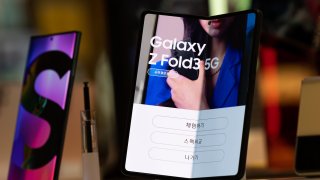
- Samsung is aiming to take its foldable phones mainstream.
- It said on Thursday that it is aiming for sales of such devices to exceed its popular Note series of handsets.
- Samsung is looking to push sales of its folding handsets to boost the profitability of its mobile division which has been hit by rising materials costs and waning consumer demand.
- For reference, Samsung shipped 190 million Note devices over the phone's lifetime, according to IDC.
- So far, Samsung has shipped over 10 million foldable phones.
Samsung is hoping to take its foldable phones mainstream, saying Thursday that it's aiming for sales of such devices to exceed its popular Note series of handsets.
The South Korean electronics giant is looking to push sales of its folding handsets to boost the profitability of its mobile division, which has been hit by rising materials costs and waning consumer demand.
Samsung first launched the Note smartphone model in 2011. It found success over the years due to its larger screen size in an era where its rivals had smaller displays.
We're making it easier for you to find stories that matter with our new newsletter — The 4Front. Sign up here and get news that is important for you to your inbox.
But as smartphones continued to get bigger, including Samsung's flagship S series of devices, the Note was eventually discontinued. Instead, the company's Galaxy S Ultra model filled the void. The Note 20, released in 2020, was the final phone in Samsung's series.
Samsung's first folding phone, the Galaxy Fold, was launched in 2019 after some technical issues. Since then, the company has released a number of other models.
But foldable phones are still a niche portion of the overall smartphone market. Samsung is hoping to turn them "mainstream," according to its earnings statement released Thursday, with the view of boosting profitability for its smartphone division.
Money Report
"In the second half we will continue to maintain the sales momentum of our S series and also use the new foldable series that will be launched in order to deliver sales volume that are above the sales volumes we used to report using the Note series," Sung Koo Kim, vice president of the company's mobile experience division, said on a conference call on Thursday.
It is unclear what timeframe Samsung is referring to for foldables to take over Note sales, given that the latter device is now discontinued. Samsung was unable to clarify when contacted by CNBC.
For reference, Samsung shipped 190 million Note devices over the phone's lifetime, according to IDC. So far, Samsung has shipped over 10 million foldable phones.
Samsung shipped about 12 million Note 20 phones, the last of the series, and about 14 million Note 10 devices. That compares to 8 million Galaxy Z Flip 3 and Galaxy Z Fold 3 devices, the latest Samsung foldable phones.
The company is gearing up to release new foldable devices next month.
"It makes sense for Samsung to place its bets on foldables: it's a premium and high margin product that drives average selling prices, and differentiates Samsung from the competition," Bryan Ma, analyst at IDC, told CNBC.
"Even if the Note line still has dedicated fans, it's also a decade old now, so putting the company's ambitions on foldables keeps the company ahead of the curve."
Indeed, profitability in its smartphone division is the main focus for Samsung. In the second quarter, earnings in the mobile business fell quarter-on-quarter due to higher costs and "adverse currency effects," Samsung said. However, revenue rose year-on-year due to increased sales of premium models such as the S22 smartphone and Tab S8 tablet series.
Samsung's Kim expects the smartphone market to remain flat or grow slightly in the second half of the year. Foldable phones will be a key part of Samsung's drive to boost profitability.
The company said it will "secure solid profitability by targeting sales of foldables that surpass those of the Galaxy Note-series and fully mainstream foldables via delivering a differentiated consumer experience enabled with global partnerships."






